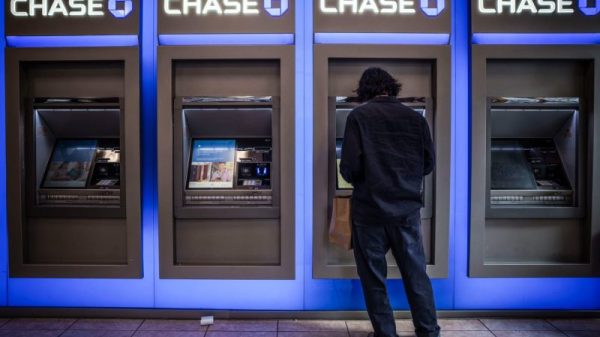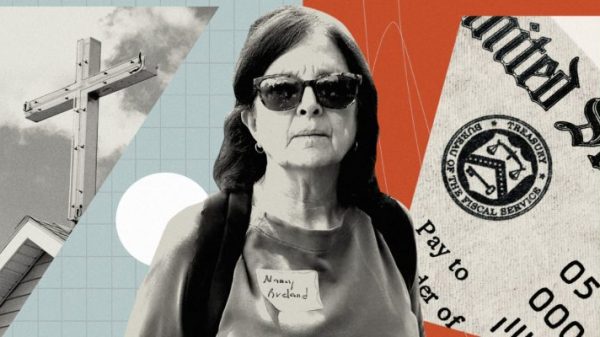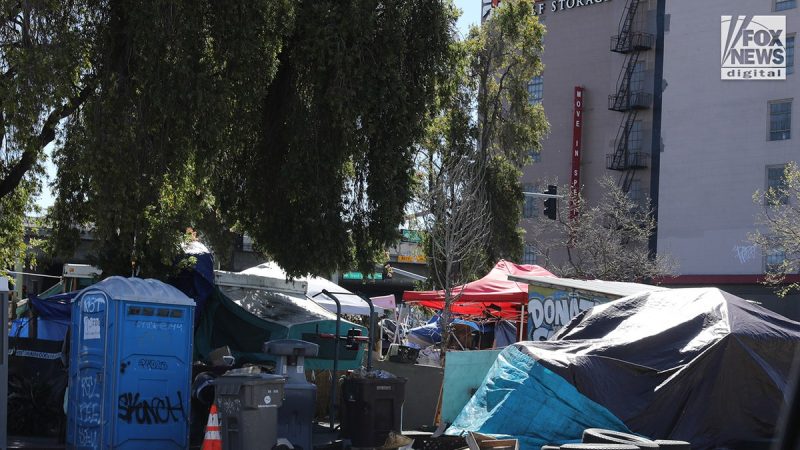The Supreme Court appeared deeply at odds on Monday over a small city’s ban on homeless people sleeping in public places, with emotional statements from the bench over society’s competing civic responsibilities.
It comes as jurisdictions across the nation – but especially in the West – struggle with a record double-digit surge in the homeless population.
The current appeal comes from officials in Grants Pass, Oregon, with almost 40,000 residents.
Municipal ordinances there ban sleeping or camping on streets, under bridges and in parks or other publicly owned property. The ban includes the use of bedding, pillows, cardboard boxes, sleeping bags, stoves or fires – with fines starting at $295.
At issue is whether the enforcement of generally applicable laws regulating camping on public property – but targeting the unhoused – constitute ‘cruel and unusual punishment’ prohibited by the Eighth Amendment.
The city argues its policies are fairly enforced, banning camping for everyone on public land. But homeless advocates say it criminalizes those who live outdoors without a stable place to call home.
In the contentious two-and-a-half hours of arguments, the justices repeatedly questioned whether the city’s law banned conduct or status – just camping on public property vs. the larger situation of being homeless.
‘Your ordinance goes way beyond that,’ said Justice Elena Kagan. ‘Your statute says that person cannot take himself and himself only, and can’t take a blanket and sleep someplace without it being a crime… It seems like you’re criminalizing a status.’
But others on the bench said these difficult on-the-ground discretionary decisions should best be left out of the hands of judges.
‘Municipalities have competing priorities,’ said Chief Justice John Roberts. ‘What if there are lead pipes in the water? Do you build the homeless shelter or do you take care of the lead pipes? Why would you think these nine people [on the court] are the best to weigh those policy judgments?’
Cities across the country will watch how the nine justices rule on this balancing act between helping the misfortunate with a range of public benefits vs. the financial and social costs associated, including crime, mental health and sanitation concerns.
San Francisco in an amicus brief said it spent over $672 million last year to provide shelter and housing for the homeless, but public encampments continue to grow. The city says its inability to enforce its own laws ‘has made it more difficult to provide services’ to that population.
About 600 people are estimated to be involuntarily unsheltered in Grants Pass, a scenic area surrounded by the Klamath Mountains in the southwest part of the state along the Rogue River.
City leaders have expressed frustration about not being able to open an appropriate government-run indoor shelter space, citing a variety of competing community views over funding, size and location.
To fill the gap, nonprofit and religious volunteers provide hot food and health care in the unhoused community, in areas like Tussing Park, which is dotted with picnic benches and landscaping.
The privately operated Grants Pass Gospel Rescue Mission offers immediate and long-term assistance. And the Mobile Integrative Navigation Team (MINT) provides free transportation for medical care and other vital services.
In its appeal to the high court, the city says its enforcement scheme ‘does not prohibit modest fines and short jail terms, which are neither cruel nor unusual by any established measure, for camping on public property.’
It said a federal appeals court ruling striking down its laws, ‘prevents governments from proactively addressing the serious social policy problems associated with the homelessness crisis, and calls into doubt many other criminal prohibitions.’
But lawyers for homeless individuals and support organizations say singling out and criminalizing this vulnerable population is not the answer, and only creates more civic problems for everyone.
‘There is simply no place in Grants Pass for them to find affordable housing or shelter,’ said the United Community Action Network, a nonprofit group that serves homeless people in Josephine County. ‘They are not choosing to live on the street or in the woods.’
Local residents say the encampments create unsafe and unhealthy conditions.
‘Families are afraid to go to the parks,’ said Brock Spurgeon. ‘And it’s not just the campers or the homeless. It’s the drug use and the vandalism and the excessive littering. Needles on the ground, broken meth pipes on the ground. So no one wants to take their kids anymore.’
In court arguments, every justice agreed the homeless problem was serious and needed to be addressed immediately, but there were disagreements over how and who should tackle it.
‘Before extending a constitutional precedent, we usually think about whether state or local law already achieves those purposes, so that the federal courts aren’t micromanaging the homeless policy,’ said Justice Brett Kavanaugh. ‘And it’s on a daily basis, when you work with the homeless… how many people are going to show up to the food bank.’
But Justice Sonia Sotomayor suggested the city here failed in that basic civic responsibility.
‘The intent is to remove every homeless person and give them no public space to sit down with a blanket or fall asleep with a blanket,’ she said. ‘Where do we put them when every city, every village, every town lacks compassion? If they pass a law identical to this, where are they supposed to sleep? Are they supposed to kill themselves [by] not sleeping?’
The homeless population in the U.S. rose 12% last year to its highest level, according to a federal Housing and Urban Development (HUD). That is about 653,000 people in the January 2023 snapshot study.
California, Washington, Florida and New York represent more than half the homeless population, with California alone comprising 28%, according to the HUD study.
Officials cite a dramatic rise in rents, as well as a drop in coronavirus pandemic-related public assistance.
The Justice Department is supporting neither party in the Grants Pass case, but says a federal appeals court properly concluded ordinances punishing people for sleeping outside where there is insufficient shelter space are unconstitutional. But it added that applying its ruling to all homeless people was wrong, ‘without requiring a more particularized inquiry into the circumstances of the individuals to whom those ordinances may be applied.’
The key to resolving this case could be how the Supreme Court applies its 1962 precedent in Robinson v. California. There, the justices concluded the Eighth Amendment’s ban on ‘cruel and unusual punishment’ prevents cities from criminalizing a person’s drug status – for simply being an ‘addict.’ But states could prosecute drug ‘conduct’ – buying, selling or possession of narcotics.
The case is City of Grants Pass, Oregon v. Johnson (23-175).





























